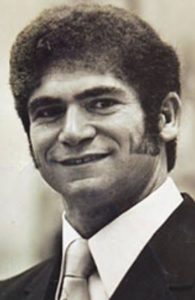War Hero, Weightlifting Champion, Holy Martyr
Yossef Romano (1940-1972) was born in Benghazi, Libya to a family of traditional Italian Sephardic Jews. The family made aliyah when he was six years old and settled in Herzliya. Romano became an interior designer, but his real passion was weightlifting. He started to compete professionally, and soon set Israeli records in the lightweight and middleweight categories. He was Israel’s weightlifting champion for nine years straight, and also coached the Hapoel Tel Aviv team. His greatest dream came true in 1972 when he represented Israel at the Munich Olympics. He promised his family that it would be his last competition and he would retire from the sport for good when he came back home. Unfortunately, on the first day of competition, he injured a knee tendon and needed surgery. Romano decided to stay and support the rest of the Israeli Olympic team. The night before his flight, Palestinian terrorists stormed the Israeli compound and took the Israeli athletes hostage. Romano was a war hero who fought valiantly in the Six-Day War, and immediately attacked the terrorists. He managed to beat one down and disarm him, but was shot by another, before being brutally tortured and killed. His bravery gave five of the athletes time to escape, including (former Jew of the Week) Shaul Ladany. The remaining 11 were all murdered by the terrorists during the botched rescue attempt. Romano’s wife, Ilana Romano, campaigned for years to have the International Olympic Committee formally honour the victims, and her request for a moment of silence at the 2012 Olympics was denied. She did manage to get the IOC to contribute $250,000 towards a memorial. This week marks the 51st anniversary of the Munich Massacre.
Words of the Week
The Jew is that sacred being who has brought down from heaven an everlasting fire and has illumined with it the entire world. He is the religious source, spring and fountain out of which all of the rest of the peoples have drawn their beliefs and their religions. The Jew is the pioneer of liberty…
– Leo Tolstoy



